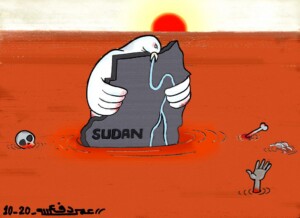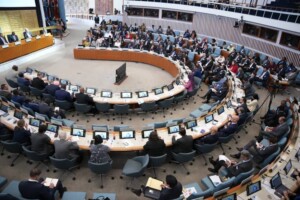Peace conference: Rebels and Sudan govt to discuss secular state issue
The Sudanese government and the Sudan People’s Liberation Movement-North led by Abdelaziz El Hilu (SPLM-N El Hilu) began the first round of informal discussions on issues including separation of state and religion yesterday.
 SPLM-N El Hilu delegation arrive in Juba for the conference on state and religion in Sudan on October 29 (Sudan Tribune)
SPLM-N El Hilu delegation arrive in Juba for the conference on state and religion in Sudan on October 29 (Sudan Tribune)
The Sudanese government and the Sudan People’s Liberation Movement-North led by Abdelaziz El Hilu (SPLM-N El Hilu) began the first round of informal discussions on issues including separation of state and religion yesterday.
The conference is set to pave the way for a Declaration of Principles agreement to become part of the Sudanese peace agreement.
After signing an accord on the basic principles for the peace negotiations on September 3, Hamdok and El Hilu also agreed to hold informal workshops “to end their differences on whether they include the secular state issue in the peace talks or not.”
Sovereign Council member Mohamed El Taayshi described the workshop as important for breaking the deadlock and continuing official direct dialogue. He expressed hope that the workshop “will be fruitful and provide an opportunity to hear opinions from various backgrounds on the essence and construction of the nation.”
Sovereign Council member Lt Gen Shamseldin Kabbashi said that the government of Sudan welcomes the meeting, indicating that this workshop will help to reach consensus on “the contentious issue of the secular state”.
“We have also raised the need to discuss the issues of self-determination, integration of the rebel fighters into the army, and cessation of hostilities, which were mentioned in the joint statement and not yet agreed upon,” he said, stressing the importance of addressing these contentious issues through this workshop or organising more workshops if needed to solve them.
Kabbashi concluded that “if consensus is reached on these issues, the Declaration of Principles can be agreed upon and signed in preparation for entering into direct negotiations”.
Background
The SPLM-N El Hilu, operating in the Nuba Mountains in South Kordofan and parts of Blue Nile state, entered the peace negotiations in Juba last year separately. Its long-standing position is to establish a viable secular Sudan that prevents imposing laws on a religious basis, and the right to self-determination for the southern region.
Talks between Khartoum and the SPLM-N El Hilu have not been smooth, as the rebel faction adhered to its long-standing position regarding a secular state. Until now, the government have been slow in cancelling the Sharia (Islamic law), imposed by the regime of Jaafar Nimeiri in September 1983, saying the matter should instead be discussed at the constitutional conference.
In August, the rebel group withdrew from the talks in Juba in protest of the chairmanship of the government delegation by Lt Gen Mohamed Hamdan ‘Hemeti’, Deputy Chairman of the Sovereign Council, who is also Commander-in-Chief of the Rapid Support Forces (RSF) militia. The rebels accuse the RSF forces of committing “heinous crimes” against civilians in various parts of Sudan.











 and then
and then